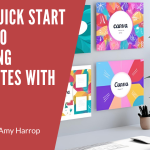 The idea of building your own publishing business might seem to be a daunting one. Building anything from scratch takes time, effort, and money.
The idea of building your own publishing business might seem to be a daunting one. Building anything from scratch takes time, effort, and money.
If you’re anything like me when I was starting out, you’re probably wondering if you’re up to the task. And believe me, I understand!
The good news is that you can already have much of what you need! And you can get the rest of it. My whole business is built around helping people just like you do what I did: build a publishing business from the ground up.
Here’s what you’ll need to get your publishing company up and running.
A Niche
There are a lot of publishing companies and online businesses, which means it’s essential to define your niche. A niche is a corner of the marketplace, and you need one because it’s not practical or affordable to try to market to every person on the web.
Here are some examples of publishing niches:
- Adult coloring books
- Journals
- Educational publishing
- Print-on-demand planners
You can, of course, choose to create a niche that’s a little bigger. A lot of the things I publish are low-content books, which include coloring books, journals, and planners. You’ll need to do some research to identify a profitable niche.
A Business Structure
When you own a business, you must consider the structure of that business. For your publishing company, you have three basic choices:
- A sole proprietorship
- A limited liability company (LLC)
- An S-corporation
The sole proprietorship is the simplest option. That and the LLC are considered pass-through organizations, meaning that you will pay taxes as an individual. The LLC offers some liability protection in the event your company is sued. That’s what I recommend.
Whatever structure you choose, you’ll need to register your business name in the state where you live. With a sole proprietorship, you only need to file a fictitious business name on the county level if you intend to use a name other than your own. With the others, you’ll need to fill out paperwork with the Secretary of State’s office.
A Domain Name
Online publishers must have a web presence, and that means you need a website. The first step to setting up a website is to register a domain name. The domain name should be your business name. Stay away from any unusual spellings or punctuation that might make your website difficult to find.
The most common business domain extension in the United States is the .com extension, but there are others as well. The most important thing is that your domain name includes your business name. If the .com version isn’t available, you should pick the simplest option that is.
Financial Tools
A business bank account will help you keep your personal and business finances separate and minimize the risk of any confusion or mishandling of business income.
You can link your business account to your personal account if you choose. In addition to a business bank account, you’ll also need:
- Accounting software
- Information about your tax responsibility
- A way to accept payments online
If you’re selling on a platform like Etsy or Amazon, you’ll be able to accept payments on that platform, but you’ll still need to specify a way to receive your money from them.
Creativity
Now that we’ve taken care of the nuts-and-bolts part of setting up a business, let’s talk about the things you’ll need to turn your publishing company into a success.
The first thing is creativity – and I believe everybody is creative. You don’t need to be a genius writer or artist to publish online. What you need is the ability to brainstorm ideas and put information from your research to work to come up with products that will sell.
Your creativity will also come into play in the marketing of your products, including social media posts. The good news about all of this is that it’s fun!
A Memorable Brand
Your brand is the sum of everything about you that appears online. It includes:
- Your website
- Your logo
- Your social media pages
- Your products
- Your product listings
- Your online store
- Your reviews and testimonials
- Your listings in online directories
If you want your publishing company to be a success, you will need to spend time creating a consistent and memorable brand. For many of the people I work with, their brand is personal, meaning that it’s attached to their name and not a company name.
To define your brand, you’ll need to think about what you offer, why people seek out your products, and how you want to be perceived. You should present your brand consistently. Some examples of brand consistency include:
- Using the same images (your logo, profile photos and cover photos) across all platforms
- Using consistent language and a consistent voice on your website, blog, and social media pages
- Interacting with customers in a way that reflects your brand’s values
You can find more information about creating a memorable personal brand here.
Content Creation and Publishing Tools
Finally, you’ll need some content creation tools to help you create products and content to promote them quickly and easily. That’s where I can help.
As I mentioned earlier, I’ve spent my online career creating courses and products to help people just like you. My products fall into five categories:
- Low Content Publishing and Print-On-Demand Publishing
- Content Automation Strategies
- Content Creation and Development
- Content Templates
- Content Software and Tools
I’ve worked hard to create an array of products that will help you to start your publishing business and turn it into a success. In other words, I’ve done the legwork for you so you can dive in and start publishing as quickly as possible!
Conclusion
I believe that building a publishing business is one of the best ways to earn money on the web. All you need is some guidance and the right tools.
To get started finding the tools you need, click here to identify your Personal Content Profit Path with my free quiz!



